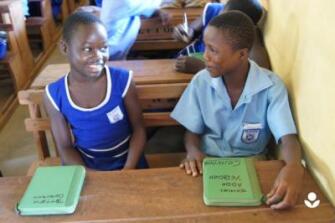Within the next three years, 1 million Amazon Kindles—preloaded with thousands of local and international books—should be in the hands of school children in Uganda, Ghana, Kenya, Rwanda, and Tanzania. The nonprofit literacy organization Worldreader announced late last month that they have partnered with DHL Express, the international express shipping company, to provide the e-readers to children in need in Africa.
Worldreader was founded in 2009 by former Microsoft and Amazon executive David Risher and a former marketing director, Colin McElwee. The organization—which provides e-readers to children in need around the world and has already donated more than 1,100 e-readers and 220,000 e-books to children in Africa—is in the process of scaling up its operations within the continent.
Under the new partnership, DHL Express will take over responsibility for delivery of the e-readers to the African countries, allowing Worldreader to purchase even more e-readers and e-books for distribution. The partnership will be part of DHL’s “GoTeach” program, which focuses on improving educational opportunities for kids around the world.

Worldreader works closely with local governments and established partners to select which schools receive the donated, preloaded e-readers, according to Nadja Borovac, the marketing manager for Worldreader. In response to written questions posed by BookMarks, Borovac said, “We then work with the educational departments in each area to equip the e-readers with the approved textbooks and recommended reading materials that correlate with the curriculum.” Worldreader also works with local publishers to digitize and upload the needed books.
Worldreader tracks the e-readers to ensure that the students receive and use the technology for their own learning, according to Borovac. The nonprofit’s findings about the impact that the e-readers have had on student learning are available on its website, along with information about student’s backgrounds, literacy level before receiving the e-readers, and usage of the readers.
In a continent with an abundance of solar-resource potential, but without a well-developed infrastructure, electricity is often hard to come by. Despite this, Borovac argues that e-readers are a still a good option: “E-readers consume relatively little power; a one-hour charge typically lasts two weeks or more.”
While the majority of Worldreader’s partner schools already have the equivalent of established electricity in Africa—meaning it can be turned on every few weeks to allow students to charge their e-readers—the nonprofit is already developing an alternate solution: solar-powered e-reader cases. Details of what organizations and firms are involved in developing the cases are not publicly available, according to Borovac, but the product is currently undergoing testing and more details will be made available in the future.
Image from Worldreader’s iRead Project in Eastern Ghana, courtesy of Worldreader.